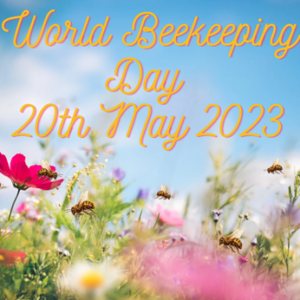Posted on: 18th May 2023, by Magrathea

World Beekeeping Day 20/05/2023
Bees are in rapid global decline as a result of habitat loss because of climate change and the impact humans are having on the planet – loss of these hugely important beasts will have huge implications on so many areas of our lives – not least food production.
On World Beekeeping Day we caught up with one of our Directors, Melanie, to find out more about her family’s fascinating hobby and important efforts towards conservation of these critical insects. Melanie’s family have been keeping bees for nearly 15 years, having always been fond of bees and being very aware of their survival plight, so when the opportunity presented itself to keep bees themselves they were keen to get involved with the rapidly growing movement of around 40,000 beekeepers in the UK who are helping the species survive.
Whilst it sounds like a peaceful gentile pastime, it is not without its challenges, although maybe not from being stung as you might imagine, bees aren’t aggressive and will avoid stinging unless they feel really threatened. Melanie explained that every hive has a queen bee – they are the top-ranking bee and are both fiercely protected and readily obeyed by the other bees in the hive. If the queen bee decides they are going to swarm, which means they are trying to leave home to find new digs, a beekeeper must act fast to find and rehouse the queen to stop the bees from swarming as a new home they choose for themselves could potentially be off your land where they will be exposed to danger and where you will no longer be able to harvest the honey yourself!
Melanie’s bees have made several attempts to swarm over the year and they once missed the first day of a much looked forward to music festival because they needed to capture the queen in the hive before she swarmed, taking the rest of the hive with her.
One of the biggest benefits of beekeeping of course is not just feeling you are doing a good thing for the future of the planet – but also to have your own honey on tap. There is nothing quite like home produced honey – it tastes amazing and far superior to shop bought. It’s also made Melanie far more aware of the planting they do in their own garden that will benefit not just their own bees but all the other pollinators visiting the area. Melanie is very concerned that the future of the bees is really in dire jeopardy, having lost a whole hive due to foraging worker bees bringing pesticides back to the hive. While humans keep using pesticides and plant without a thought for pollinators but explains that every change will help. Melanie said “one of our local councils planted a wildflower mix in their verges and central reservations a while ago and I have heard of others letting the verges grow until the flowers and grasses have seeded. This will all help and hopefully more people will get interested in helping and preserving this most important insect”.
We all need to do our bit to help the future of bees – my own pledge is to let the weeds flourish in my garden as these resilient early flowering weeds are a vital source of food for bees emerging from the winter. If food production suffers from the decline in bees we will all be in trouble – no doughnuts = no developers and where would our industry be then!